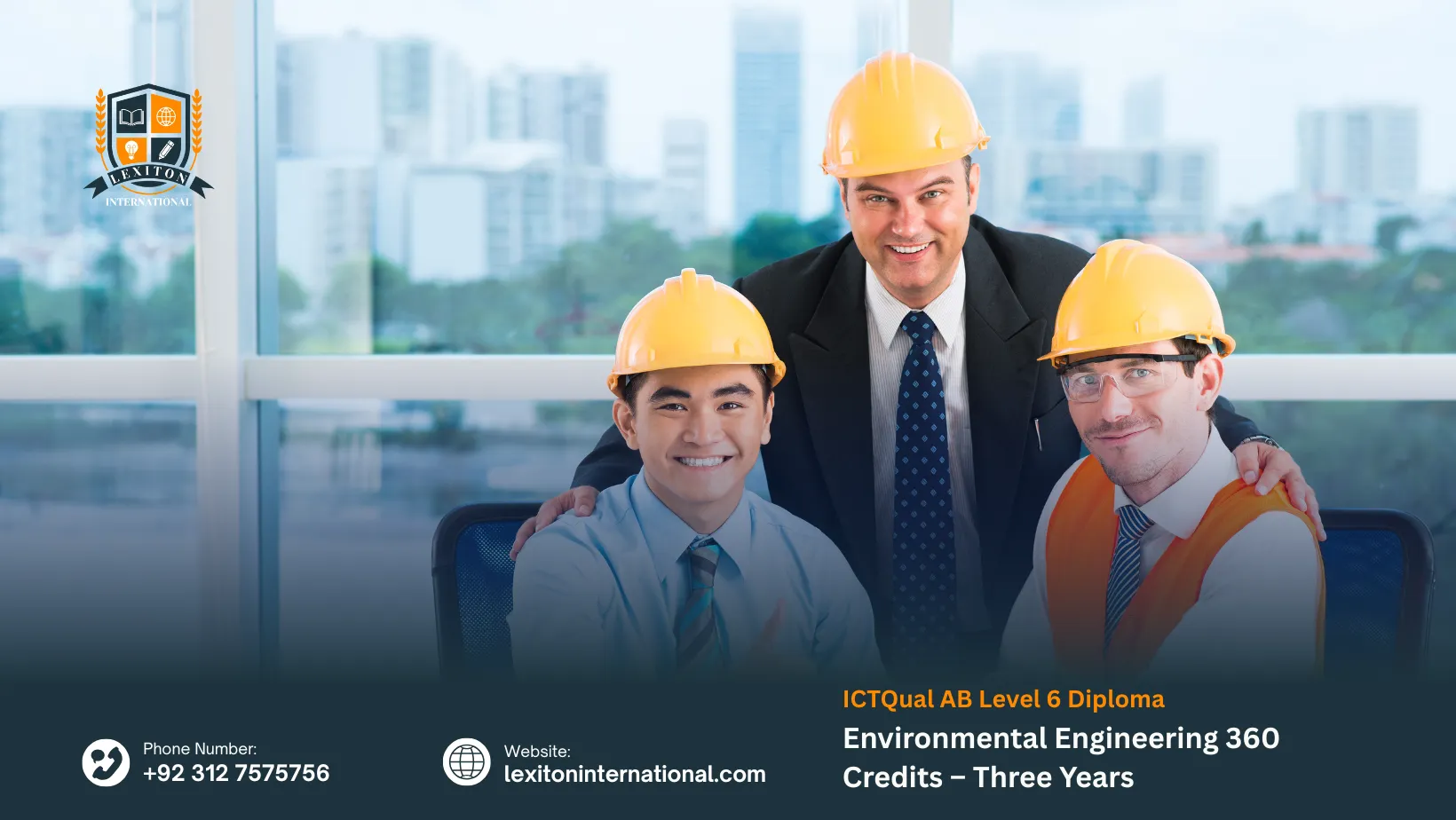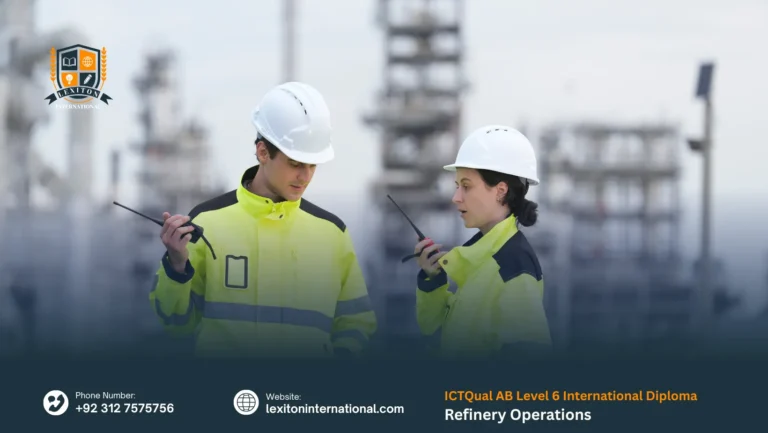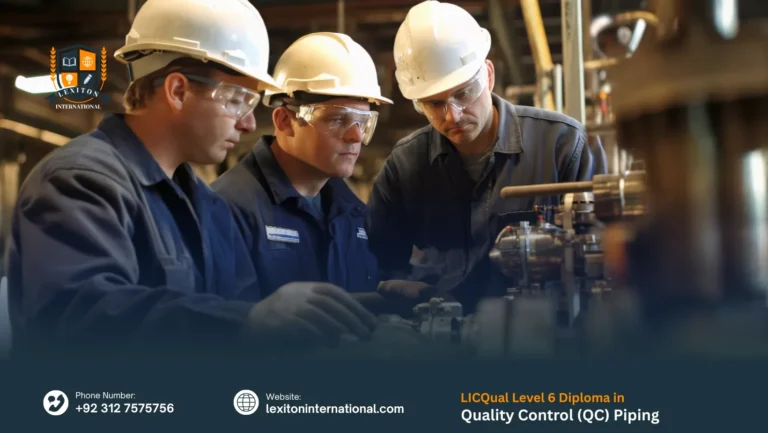As environmental challenges continue to grow, innovative and sustainable solutions are more critical than ever. The ICTQual Level 6 Diploma in Environmental Engineering is a comprehensive program designed for individuals passionate about engineering, sustainability, and creating a positive impact on the planet. This diploma equips learners with the advanced technical knowledge and practical skills required to tackle complex environmental issues.
Spanning three years, the program provides an in-depth exploration of environmental engineering principles. Students gain expertise in key areas such as pollution control, sustainable resource management, water and wastewater engineering, and renewable energy systems. By integrating theoretical learning with practical applications, the course prepares graduates to address global environmental challenges with confidence and competence.
This diploma is ideal for aspiring environmental engineers, sustainability consultants, and professionals seeking to enhance their expertise. Whether you are a recent graduate looking for specialized training or an industry professional aiming to advance your career, the program offers a structured pathway to achieve your professional goals.
Graduates of the ICTQual Level 6 Diploma are highly sought after in sectors including construction, energy, water management, and government agencies. Potential career paths include environmental engineer, sustainability manager, energy consultant, and policy advisor. The curriculum’s focus on practical problem-solving and industry-ready skills ensures that learners are prepared to contribute effectively to sustainable development initiatives.
With its rigorous academic framework and strong industry relevance, the ICTQual Level 6 Diploma in Environmental Engineering provides students with the knowledge, skills, and leadership foundation needed to excel in a dynamic and globally important field.
To ensure learners gain the most from the ICTQual Level 6 Diploma in Environmental Engineering, applicants are expected to meet the following entry criteria:
- Educational Background:
- A minimum of Level 5 qualification in engineering, environmental science, or a related field.
- Applicants with strong work experience in environmental or engineering roles may also be considered.
- Age Requirement:
- Learners should be 18 years or older, making it suitable for recent graduates and professionals.
- Language Proficiency:
- Since the course is delivered in English, learners should have proficient English language skills (IELTS 5.5 or equivalent for international students).
- Technical Knowledge:
- A foundational understanding of mathematics, physics, and environmental science principles is recommended.
- Practical Experience (Optional but Beneficial):
- Work or internship experience in engineering, sustainability, or environmental projects will enhance understanding and engagement with the course.
- Digital Literacy:
- Basic skills in using computers, online learning platforms, and software applications are necessary for completing assignments and assessments.
- Motivation and Commitment:
- Learners should demonstrate a passion for sustainability, environmental protection, and innovative engineering solutions.
Mandatory Units
This qualification, the ICTQual AB Level 6 Diploma in Environmental Engineering 360 Credits – Three Years, consists of 36 mandatory units.
Year 1: Foundations of Environmental Engineering
Year 2: Specialized Environmental Engineering Topics
Year 3: Advanced Studies and Practical Applications
Learning outcomes of ICTQual AB Level 6 Diploma in Environmental Engineering 360 Credits – Three Years:
Year 1: Foundations of Environmental Engineering
- Introduction to Environmental Engineering
- Understand the fundamental concepts and scope of environmental engineering.
- Explain the role of environmental engineers in solving global environmental issues.
- Environmental Science Principles
- Demonstrate knowledge of key environmental science concepts and their applications in engineering.
- Assess the interaction between human activities and environmental systems.
- Basics of Environmental Chemistry
- Understand the chemical processes that impact environmental systems.
- Identify pollutants and their effects on air, water, and soil quality.
- Introduction to Renewable Energy Systems
- Gain an overview of renewable energy technologies, including solar, wind, and biomass.
- Evaluate the environmental benefits and challenges of renewable energy sources.
- Mathematics for Environmental Engineers
- Apply mathematical principles to solve engineering problems related to environmental systems.
- Develop proficiency in calculations involving fluid dynamics, pollution control, and energy efficiency.
- Engineering Mechanics and Materials
- Understand the principles of engineering mechanics in the context of environmental engineering.
- Identify materials used in environmental engineering and their properties.
- Introduction to Fluid Mechanics
- Grasp basic concepts in fluid mechanics, including flow, pressure, and velocity.
- Apply fluid dynamics principles to environmental engineering problems such as water treatment and waste management.
- Pollution Control and Prevention
- Identify various types of pollution and their sources.
- Propose engineering solutions for the prevention and control of pollution in different environmental contexts.
- Environmental Regulations and Standards
- Understand environmental laws and regulations at national and international levels.
- Evaluate how these regulations impact environmental engineering practices.
- Soil Science and Geotechnical Engineering
- Gain knowledge of soil properties and their significance in environmental engineering.
- Analyze soil contamination and remediation techniques.
- Introduction to Sustainable Development
- Define sustainable development and its importance in environmental engineering.
- Identify practices that promote sustainability in engineering projects.
- Communication Skills for Engineers
- Develop effective communication skills for technical writing, presentations, and teamwork in engineering contexts.
- Present complex environmental engineering concepts clearly and concisely.
Year 2: Specialized Environmental Engineering Topics
- Advanced Water Supply and Wastewater Treatment
- Understand advanced techniques in water purification, treatment, and distribution.
- Design and evaluate wastewater treatment systems for environmental sustainability.
- Air Pollution Control and Management
- Identify sources of air pollution and their environmental impacts.
- Develop strategies for air quality monitoring and pollution control.
- Waste Management and Recycling Techniques
- Analyze waste management practices and recycling technologies.
- Design sustainable waste management systems for urban and industrial applications.
- Hydrology and Water Resources Management
- Apply hydrological principles to manage water resources efficiently.
- Design systems for water conservation and sustainable usage.
- Advanced Renewable Energy Technologies
- Analyze and evaluate emerging renewable energy technologies.
- Develop engineering solutions for integrating renewable energy systems into the existing infrastructure.
- Environmental Impact Assessment (EIA)
- Conduct environmental impact assessments for engineering projects.
- Identify potential environmental impacts and propose mitigation strategies.
- Risk Management in Environmental Engineering
- Apply risk management strategies to assess and minimize environmental risks.
- Develop risk assessment models for environmental engineering projects.
- Environmental Economics and Policy
- Understand the economic aspects of environmental issues and sustainability.
- Analyze policies and their impact on environmental engineering practices.
- Sustainable Infrastructure and Urban Planning
- Design and evaluate infrastructure projects with a focus on sustainability.
- Integrate sustainable urban planning principles in engineering solutions.
- Climate Change and Environmental Adaptation
- Examine the impacts of climate change on environmental systems.
- Develop engineering strategies for adaptation to climate change challenges.
- Environmental Data Collection and Analysis
- Gather and analyze environmental data for decision-making in engineering projects.
- Use software tools and methodologies to interpret environmental data effectively.
- Environmental Project Management
- Manage environmental engineering projects from planning to execution.
- Develop project management skills, including budgeting, timelines, and team coordination.
Year 3: Advanced Studies and Practical Applications
- Sustainable Resource Management
- Understand principles of sustainable resource use and conservation.
- Design systems for efficient management of natural resources.
- Advanced Environmental Chemistry
- Apply advanced chemical principles to address complex environmental challenges.
- Analyze the chemical processes involved in pollutant degradation and treatment.
- Energy Efficiency and Green Technologies
- Design and implement energy-efficient systems and green technologies.
- Analyze the role of energy efficiency in reducing environmental impacts.
- Environmental Monitoring and Data Systems
- Develop and implement systems for monitoring environmental parameters.
- Use advanced technologies for environmental data collection and analysis.
- Life Cycle Assessment and Eco-Design
- Conduct life cycle assessments to evaluate the environmental impacts of products and processes.
- Apply eco-design principles to create environmentally friendly products and systems.
- Green Building and Construction Techniques
- Understand sustainable construction methods and green building standards.
- Design and implement energy-efficient and environmentally sustainable buildings.
- Environmental Biotechnology
- Explore the use of biotechnology in environmental engineering applications.
- Analyze the role of bioremediation and microbial technologies in environmental cleanup.
- Environmental Law and Ethics
- Understand the legal and ethical considerations in environmental engineering.
- Evaluate the role of laws in regulating environmental protection and engineering practices.
- Research Methodology in Environmental Engineering
- Develop skills in research design and methodology specific to environmental engineering.
- Conduct scientific research and analysis in environmental engineering topics.
- Environmental Engineering Design Projects
- Apply engineering principles to design sustainable environmental systems and solutions.
- Work on complex design projects addressing real-world environmental issues.
- Industrial Internship in Environmental Engineering
- Gain hands-on experience through an industrial internship.
- Apply theoretical knowledge to practical environmental engineering tasks in the workplace.
- Research Project and Dissertation
- Conduct independent research on a selected environmental engineering topic.
- Present findings in a comprehensive dissertation that demonstrates critical thinking and research skills.
The ICTQual AB Level 6 Diploma in Environmental Engineering 360 Credits – Three Years is designed to cater to a wide range of learners who are motivated to build a successful career in environmental engineering, sustainability, and related sectors.
Aspiring Environmental Engineers
- Individuals seeking a specialized qualification in environmental engineering.
- Learners who want to develop technical expertise in pollution control, renewable energy, and water management.
- Students aiming to apply engineering principles to solve real-world environmental challenges.
- Graduates looking for a structured program to enhance employability in engineering sectors.
- Individuals passionate about creating sustainable solutions for environmental protection.
- Learners aiming to gain international recognition for their environmental engineering skills.
Sustainability Consultants and Professionals
- Professionals working in sustainability, energy management, or environmental projects.
- Those looking to advance their careers with an accredited diploma.
- Individuals seeking practical skills to implement sustainable practices in organizations.
- Professionals aiming to develop leadership skills in environmental projects.
- Learners who want to enhance their knowledge of environmental regulations and compliance.
- Those interested in shaping policies or strategies for sustainable development.
Recent Graduates
- Students with a background in engineering, environmental science, or related disciplines.
- Learners seeking specialized training before entering the workforce.
- Graduates looking for a career-oriented program with strong industry relevance.
- Individuals planning to pursue higher education in environmental engineering or sustainability.
- Students aiming to gain hands-on skills and practical experience.
- Those who want to stand out in competitive job markets.
Industry Professionals Seeking Advancement
- Engineers and technical staff looking to update skills and expand knowledge in environmental engineering.
- Professionals aiming for managerial or supervisory roles in sustainability or environmental projects.
- Individuals seeking recognition of prior experience through an internationally recognized diploma.
- Those interested in cross-disciplinary applications of environmental engineering.
- Learners looking to enhance problem-solving, project management, and technical skills.
- Professionals motivated to contribute to sustainable development initiatives in their organizations.
This course is ideal for learners who are motivated, passionate about sustainability, and committed to making a difference in environmental engineering. Whether you are a new graduate, career changer, or experienced professional, the ICTQual Level 6 Diploma provides the knowledge, practical skills, and industry-recognized accreditation to advance your career and drive impactful solutions in the field.
Completing the ICTQual AB Level 6 Diploma in Environmental Engineering 360 Credits – Three Years opens a wide range of educational and career pathways. The program equips learners with the knowledge, technical expertise, and practical skills required to excel in environmental engineering and sustainability roles globally.
Higher Education Opportunities
- Progress to ICTQual Level 7 Advanced Diploma or postgraduate programs in environmental engineering or related fields.
- Gain eligibility for professional certifications and international engineering accreditations.
- Develop the academic foundation for research and innovation in sustainability and environmental solutions.
- Prepare for specialized training in climate change mitigation, waste management, and green technologies.
- Enhance qualifications for global recognition and advanced career opportunities.
Career Advancement Opportunities
- Pursue roles in environmental engineering, sustainability consultancy, and energy management.
- Work in sectors such as construction, renewable energy, water management, and government agencies.
- Qualify for positions like environmental engineer, sustainability manager, energy consultant, or policy advisor.
- Strengthen skills for leadership or project management roles in environmental projects.
- Gain a competitive edge for employer-sponsored development programs.
- Access opportunities in international environmental organizations and NGOs.
- Prepare for consultancy or advisory roles in engineering and sustainability projects.
Professional Skills Development
- Build expertise in pollution control, resource management, and environmental impact assessment.
- Develop leadership, teamwork, and project management skills for professional practice.
- Gain proficiency in renewable energy systems and water/wastewater engineering.
- Enhance problem-solving, decision-making, and analytical abilities.
- Strengthen practical competencies for compliance with environmental regulations.
- Cultivate skills that are transferable across global environmental engineering projects.
- Prepare for continuous professional development and lifelong learning.
Specialized Career Pathways
- Engage in climate change mitigation and sustainability projects.
- Work in water and wastewater management, environmental monitoring, and green infrastructure development.
- Contribute to energy efficiency and renewable energy initiatives.
- Pursue roles in environmental auditing, consulting, and policy formulation.
- Apply knowledge in urban planning and sustainable construction projects.
- Gain expertise for research and innovation roles in environmental technology.
- Access opportunities in international environmental and sustainability programs.
Entrepreneurship and Independent Roles
- Establish private environmental consultancy services.
- Launch sustainable energy or water management projects.
- Provide advisory services for green building and construction projects.
- Develop community-based sustainability programs.
- Offer training and mentorship in environmental engineering.
- Contribute to policy development and environmental advocacy initiatives.
- Explore freelance opportunities in international sustainability projects.
Leadership and Management Development
- Prepare for team leader, project manager, or coordinator roles in environmental projects.
- Develop strategic planning and operational management skills.
- Gain confidence in policy implementation, compliance, and regulatory standards.
- Strengthen abilities in staff mentoring and professional development.
- Learn to manage environmental engineering projects and sustainability programs.
- Cultivate decision-making and problem-solving skills for leadership roles.
- Advance toward executive or senior management positions in environmental engineering and sustainability sectors.
The ICTQual Level 6 Diploma in Environmental Engineering is a launchpad for academic growth, professional development, and impactful careers in environmental engineering and sustainability. Graduates are well-equipped to pursue higher education, assume leadership roles, or contribute meaningfully to global environmental initiatives.
Curious About This Course?







